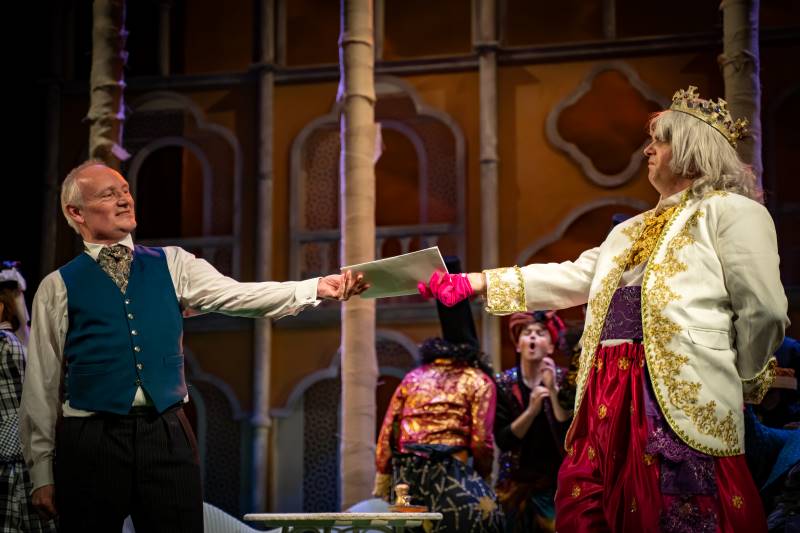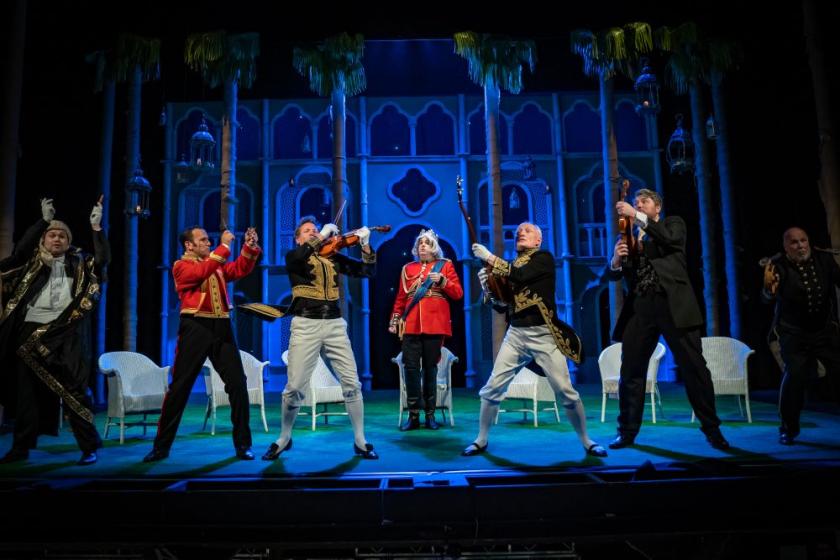Joseph Heller grew tired of being told that he’d never written anything as good as Catch 22. ‘Who has?’, he'd retort. In the same spirit, it’s futile to compare Gilbert and Sullivan’s late flop Utopia, Limited to The Mikado, The Gondoliers, Iolanthe or The Pirates of Penzance.
So it’s not as good. Well, what is? True, you’ll meet occasional Savoyards who claim it’s their personal favourite, just as there are Mozartians (seriously, they walk among us) who maintain that La Clemenza di Tito is their personal number one. Sure, you mutter as you edge slowly away, trying to avoid eye contact. Sure. Of course it is. I see what you've done there.
Still, there’s no harm, every few years, in taking Utopia, Limited off the shelf and seeing what fun we can have with it. Scottish Opera mounted a spirited semi-staging last season; now the unsinkable team at the National Gilbert and Sullivan Opera Company have gone the whole way for only the second time in their 28-year history, with scenery, costumes, a full professional company and direction by Jeff Clarke. Clarke is the creative force behind of the sublime shoestring company Opera della Luna, and if we might wish that he’d been given these kind of resources to throw at some of ODL’s recent operetta rediscoveries – The Arcadians, say, or The Chocolate Soldier – there’s probably no director better equipped to patch over Utopia, Limited’s weaknesses and to make the most of its real but sporadic strengths.
So the curtain raises on languishing maidens, Moorish architecture and lofty palms: a rose-tinted vision of Utopia as a lotus-eating sultanate somewhere East of Suez. King Paramount (Ben McAteer, reprising the role from Scottish Opera) and his court loll about in silky dresses and Turkish slippers, or fill the stage with lively choreography. G&S botch the pacing of Act One very badly indeed but since they’re going all out for languor and silly dancing, Clarke and his cast lean into it, with the malevolent wise men Scaphio and Phantis (Robert Gildon and Giles Davies) throwing some very daft shapes indeed while dressed in outsize breeches and stovepipe hats, while the orchestra and chorus are buoyant and warm.
That’s a welcome development. The scratchy quality of the pit bands has been the most serious weakness of previous NGSOC productions, but this time they’ve invested in the orchestra, and the difference is immense. With a 26-piece ensemble under the direction of John Andrews, the ceremonial scenes take on real weight, the dance music has a satiny sensuality and the whole ensemble sound is continually warmed from within by Sullivan’s delicate woodwind underlinings: doleful bassoon, questioning oboe, or a pair of clarinets, glowing just beneath the surface of the melody. This is unquestionably the best playing and the most stylish conducting I’ve heard in a NGSOC production, and it carries us up to and over the single most embarrassing moment in the G&S canon, when the pair reintroduce Captain Corcoran from HMS Pinafore and – inevitably – he gets a bigger laugh than any of the new material. What, never? If only. But after the interval Utopia, Limited finds its feet, and from this point on Clarke and his cast positively danced away with it. There’s no massed standing around or stagey gesturing; in fact, the direction is amusingly detailed – the British visitors gradually, and individually, getting sozzled on Utopian hospitality while the two younger princesses get up to increasingly elaborate mischief at the expense of their guests. The main focus of the satire – King Paramount’s misguided reverence for all things British – is worn lightly and cheerfully. Clarke even manages to work in a sight-gag about the less savoury legacy of colonialism without making you feel like you’ve been beaten about the head with the collected works of Edward Said – a rare achievement in contemporary opera direction.
But after the interval Utopia, Limited finds its feet, and from this point on Clarke and his cast positively danced away with it. There’s no massed standing around or stagey gesturing; in fact, the direction is amusingly detailed – the British visitors gradually, and individually, getting sozzled on Utopian hospitality while the two younger princesses get up to increasingly elaborate mischief at the expense of their guests. The main focus of the satire – King Paramount’s misguided reverence for all things British – is worn lightly and cheerfully. Clarke even manages to work in a sight-gag about the less savoury legacy of colonialism without making you feel like you’ve been beaten about the head with the collected works of Edward Said – a rare achievement in contemporary opera direction.
The singing was splendid, too. McAteer (pictured above, with Paul Featherstone), who’d sounded positively Wagnerian as he announced his resolve to turn his kingdom into a limited liability company at the end of Act One, was an imposing and intensely sympathetic figure in an atrocious hairpiece – easy prey for the geezerish wiles and physical agility of Paul Featherstone’s spivvy Mr Goldbury. Anthony Flaum (Fitzbattleaxe) and Monica McGhee (a deliciously arch Princess Zara) blended richly in their barely-there romantic subplot, with McGhee’s clear, chiming soprano flickering brightly at the top of the ensemble numbers.
And talking of ensemble numbers, the Act Two patter-septet – Utopia, Limited’s catchiest number by a country mile – was everything it should be and more: exuberantly staged, wittily updated and delivered with gin-and-tonic clarity and a spritz of satirical zest. It got a lot of cheers at Buxton Opera House, and it deserved them: a useful reminder that even at their weakest, G&S still outclass all but the very finest efforts of their French and German contemporaries. It’s going to Harrogate next, and if you’ve been waiting to tick Utopia, Limited off your operetta bucket list, you needn’t hesitate.














Add comment